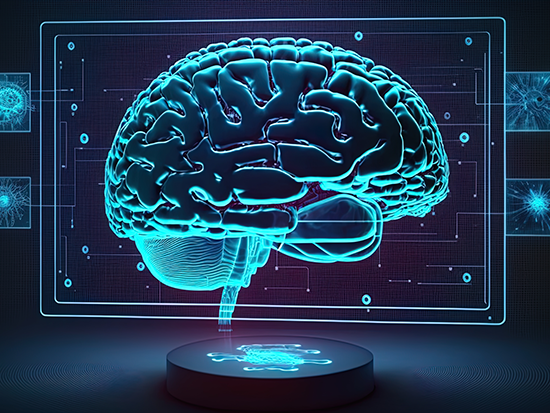 Neuroengineering blends engineering principles with neuroscience to find better ways to treat neurological conditions and to build on understanding how the brain and nervous system function.Blending neuroscience and bioengineering, the University of Alabama at Birmingham will host NeuroGateways 2023, a symposium devoted to the new and developing field of neuroengineering. The event, featuring distinguished speakers from around the country along with UAB experts, will be March 30-31 at the UAB National Alumni Society House, 1301 10th Ave. South, Birmingham. The event is hosted by the UAB Consortium for Neuroengineering and Brain-Computer Interfaces, a UAB pilot University-Wide Interdisciplinary Research Center program.
Neuroengineering blends engineering principles with neuroscience to find better ways to treat neurological conditions and to build on understanding how the brain and nervous system function.Blending neuroscience and bioengineering, the University of Alabama at Birmingham will host NeuroGateways 2023, a symposium devoted to the new and developing field of neuroengineering. The event, featuring distinguished speakers from around the country along with UAB experts, will be March 30-31 at the UAB National Alumni Society House, 1301 10th Ave. South, Birmingham. The event is hosted by the UAB Consortium for Neuroengineering and Brain-Computer Interfaces, a UAB pilot University-Wide Interdisciplinary Research Center program.
Conference organizers say neuroengineering could have a tremendous impact on a number of neurologic conditions such as stroke, neurodegenerative disorders, Parkinson’s disease, dementia and other brain diseases.
“Neuroengineering involves the application of engineering principles to better understand the brain, and develop new therapies or treatments for neurological disorders,” said conference organizer Mark Bolding, Ph.D., associate professor in the Division of Advanced Medical Imaging in the Department of Radiology and associate director of the CNBCI. “Our goal is to bring academic researchers, industry, government, and stakeholders/sponsors together to lay out a framework for boosting neuroengineering in Alabama.”
The symposium will feature three primary themes: neurorehabilitation, neuromodulation and neurodata.
Neurorehabilitation involves treatment and therapies to help recover lost functions, such as physical therapy, occupational therapy, speech-language therapy, cognitive therapy and psychosocial support. It can improve mobility, communication, daily living activities, emotional adjustment and quality of life.
Neuromodulation aims to improve the quality of life for patients by altering the activity of the brain, spinal cord or peripheral nerves to achieve therapeutic outcomes or restore function diminished or lost by diseases.
Neurodata collection and integration combines the vast amount of neural and imaging data, clinical parameters, and outcomes generated by the varied internal or external sources into a relational database and provides a user platform for hypothesis-driven queries and Big Data analyses.
“Understanding how to make use of the massive data sets created in this field is a major goal of the CNBCI,” said Lynn Dobrunz, Ph.D., professor in the Department of Neurobiology and director of the CNBCI. “This conference will bring thought leaders and researchers together with a goal of building relationships and harnessing excitement for the future of this extremely important new field of research.”
Speakers at the symposium will represent the National Institutes of Health, University of Alabama, Carnegie Mellon University, University of Illinois, University of Wisconsin–Madison, Baylor College of Medicine, University of Houston University of Michigan, University of Florida, University of Louisville and UAB.
For more information or to register for the symposium, go to NeuroGateways 2023. Abstract submission for the symposium’s poster session is open. Sponsors include the Bevill Family Foundation, Consortium for Neuroengineering and Brain Computer Interfaces, Civitan International Neuroimaging Laboratory, Department of Neurobiology in the Marnix E. Heersink School of Medicine, Marnix E. Heersink Institute for Biomedical Innovation, IST, and NIRx.
UAB launched a neuroengineering Ph.D. program in 2020, a collaboration between the School of Engineering and the Heersink School of Medicine. It is a first-of-its-kind program in the state of Alabama, and one of the only freestanding neuroengineering doctoral programs in the country.
In 2021, faculty from the UAB School of Engineering and the departments of Neurobiology, Neurology and Neurosurgery in the Heersink School of Medicine established the Neuroengineering and Brain-Computer Interface Initiative, combining neurobiology, neuroimaging, neural interface technology and the latest developments in neuroscience with engineering and analytics to synergize and advance research, education and patient care at UAB and beyond. The NBCII, which was led by Dobrunz and Nicole Bentley, M.D., assistant professor in the Department of Neurosurgery, transitioned to the CNBCI in 2022. In addition to Dobrunz and Bolding, leadership of the CNBCI includes co-director Bentley and associate director William “Jamie” Tyler, Ph.D., professor in the Department of Biomedical Engineering.